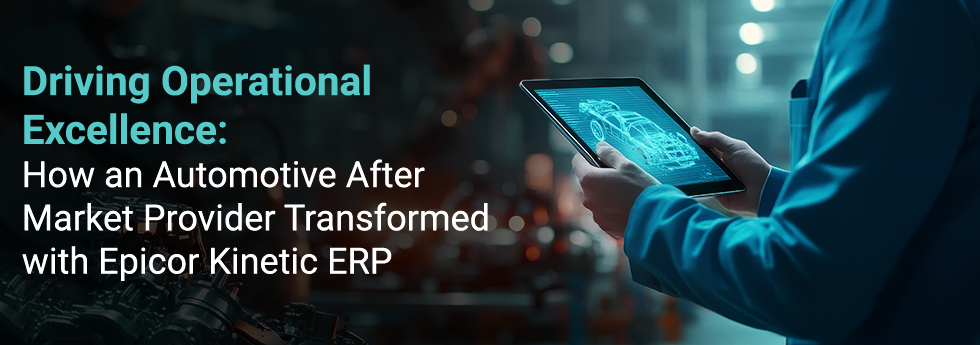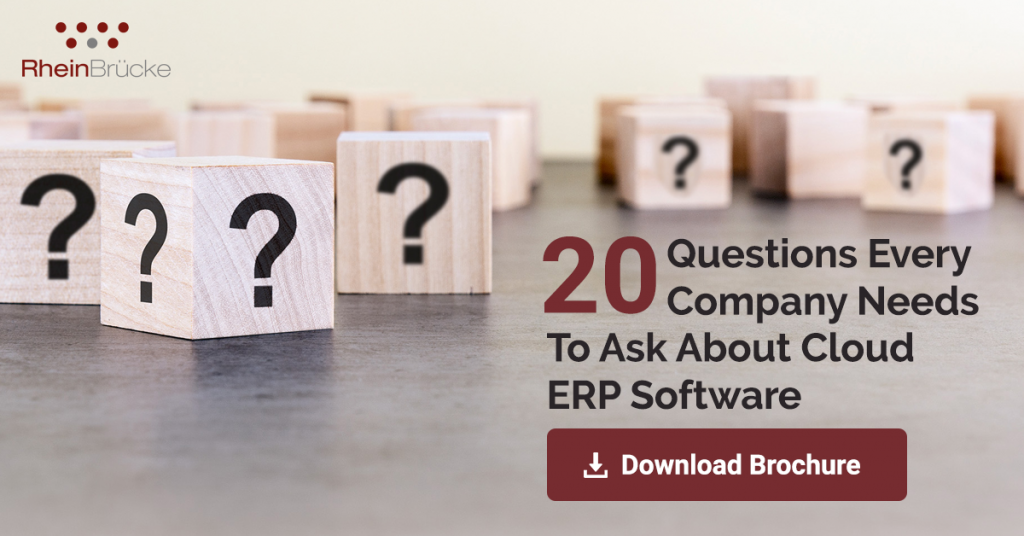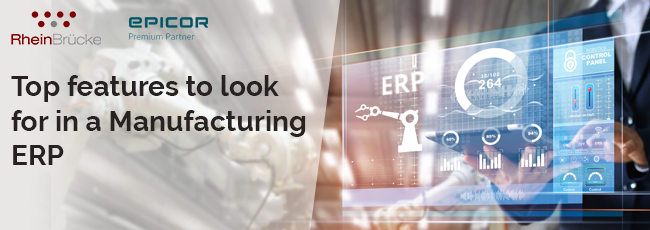
Understanding the need for manufacturing ERP
With the continuous advancement in technology, massive changes have occurred in the manufacturing business, ranging from Big Data to Internet of Things and Industry 4.0, as well as from digital warehouses to technology enabled supply chains.
In addition to the unpredictability of the national and worldwide economic environment, manufacturers confront a variety of internal problems. Manufacturing industry has been hit hard by the recent coronavirus outbreak. While businesses like Information Technology and Medical Sector have seen a surge in demand, on the other side industries like Aviation and the Automobile industry have struggled to keep up. Supply chain issues have plagued nearly all manufacturers. Like many other industrial sectors, manufacturers are becoming increasingly conscious that even after the pandemic, there will be several fundamental changes in the industry, such as increase in automation and emphasis on smaller and more localised operations. Also, the departmental silos in manufacturing companies increase barriers impacting coordination of their activities across the board. This makes it difficult for them to successfully handle rising competition and abrupt variations in demand.
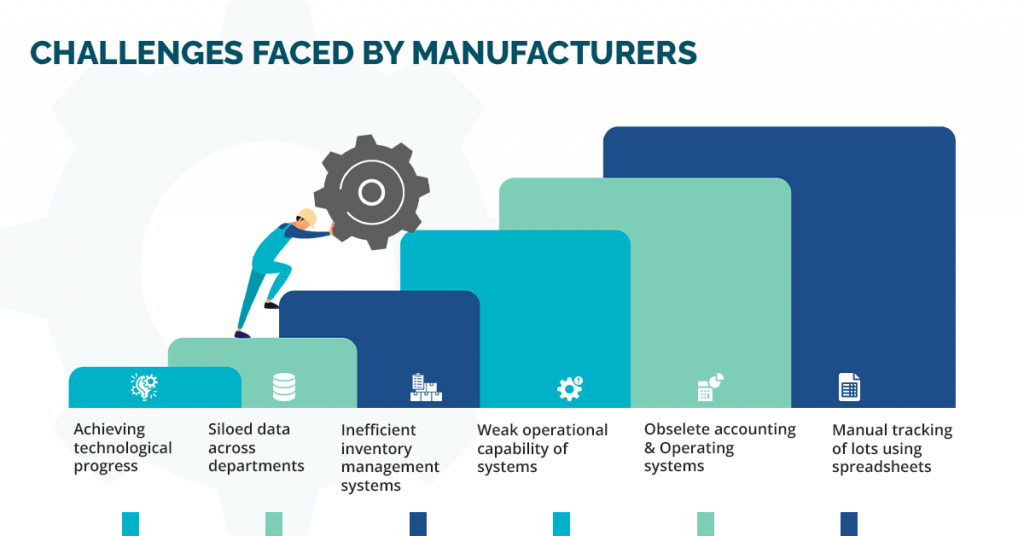
ERP software for the manufacturing industry can address all these challenges. It can act as an integrated solution for managing end-to-end business processes from shop floor to top floor – resources, operations, monitoring, reporting, sales, accounting, finance, and more. The pandemic and the disruptions following it has caused significant changes in the manufacturing ERP market as well. The pandemic has pushed manufacturers to rapidly shift gears, from on-premise and legacy applications to modern cloud-based ERPs that allow them to respond quickly. Many vendors have now started offering niche solutions that are intended to specific sub-verticals. According to a recent market research report, the Manufacturing applications market is expected to reach $28.4 billion by 2024.
Benefits of Manufacturing ERP
A standard ERP is designed with a one-size fits all approach and may lack several critical features for a manufacturing-specific business. Whereas, a manufacturing ERP system provides deeper and more advanced capabilities to meet manufacturing-specific requirements and automate core manufacturing processes. Manufacturers of all size can benefit from manufacturing-specific ERPs and realize faster ROI compared to implementing a generic ERP. They offer several advantages over generic ERPs, including the ability to manage and automate key manufacturing operations, maintaining inventory levels, and keeping track of everyday finances and accounting. A manufacturing ERP with the right capabilities can help improve your manufacturing efficiency significantly.
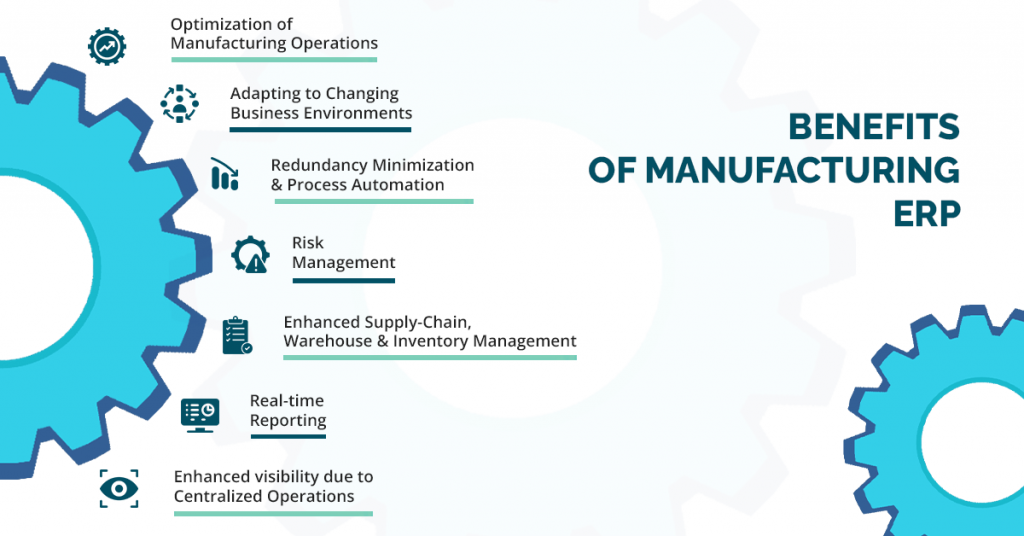
What are the essential features required in a Manufacturing ERP?
With so many ERPs available in the market, selecting the one that best fits your company’s requirements can become a tricky process. There are N number of Manufacturing ERPs available in the market today. So, how do you choose the best-fit ERP from those? What are the minimum features needed in and ERP for manufacturing businesses? Here is a comprehensive list of features manufacturers should look for in their ERP:
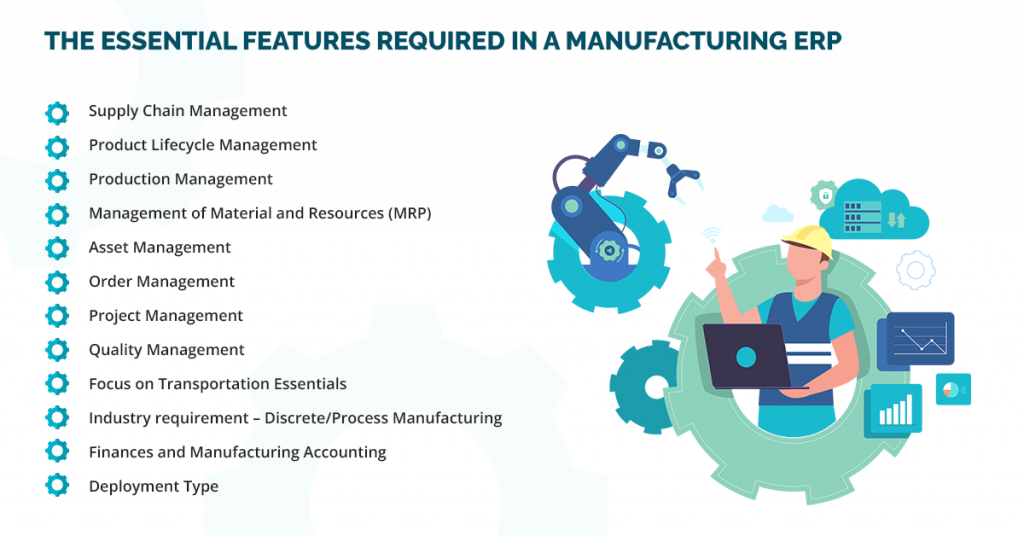
1. Supply Chain Management
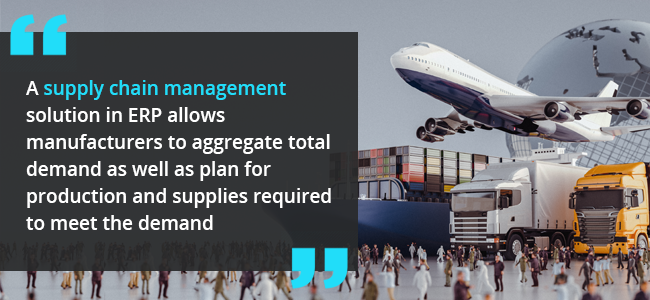
Managing the supply chain is crucial to manufacturing, both in terms of inflow and outflow of resources. It helps in enabling an effective communication between suppliers, manufacturers, and consumers. A supply chain management solution in ERP allows manufacturers to aggregate total demand as well as plan for production and supplies required to meet the demand. It thus helps manufacturers consolidate information across sales, production, inventory and purchasing and optimize their manufacturing processes by becoming more demand-driven. The supply chain management capabilities in an ERP include purchase management, demand management, inventory management, shipping and receiving, warehouse management, supplier management, etc.
2. Product Lifecycle Management
ERP for manufacturers should offer well defined product lifecycle management features to allow manufacturing companies to monitor and manage all stages of a product lifecycle, from conception through production to distribution. This will help in improving product quality, reduce costs, optimize quality, reduce wastage of resources and so on.
3. Production Management
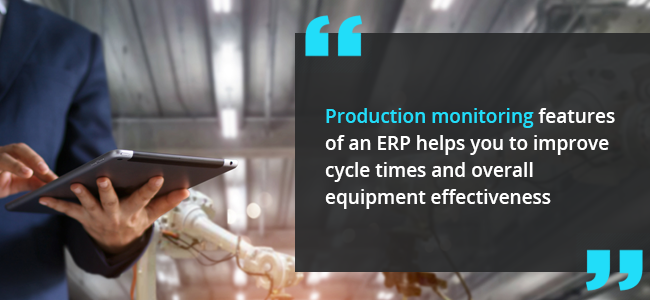
A production management module in an ERP provides visibility throughout the production chain and optimizes production capacity to keep costs low and meet customer expectations. Some of the features required for production management are planning, scheduling, job management, lean production management, managing quotations and estimations, quality assurance and quality management, etc. Production management feature in an ERP also assists in maintaining documentation and contracts, observing statistical process control, machine integrations, and keeping track of the landed costs. With production monitoring features in an ERP, you could get data directly from machines and operators, receive alerts for machine conditions, process variations, preventive maintenance, etc to improve cycle times and overall equipment effectiveness as well as enhance risk management.
4. Management of Materials/Resources (MRP)
This feature allows manufacturers to keep track of inventory, handle requests, make use of the barcode technology, BOM management, and assist users in predicting future material requirements.
5. Asset Management
Making sure that your solution can effectively manage your assets is one of the most important criteria to look for in an ERP. The asset management system should have the capabilities to manage fixed assets and capital projects, monitor and minimize energy requirements, and manage products during their full lifespan.
6. Order Management
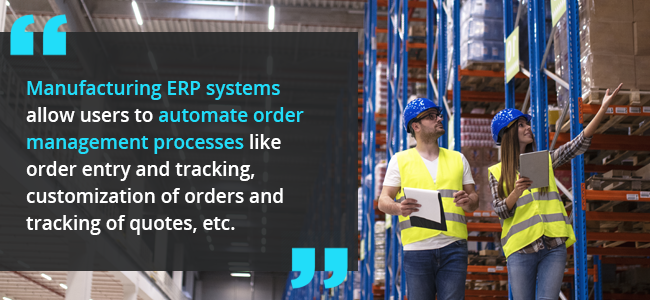
As a manufacturer, you need order management features to ensure that your product reaches to your consumers on schedule and with minimum damage and mistakes. Most of the ERP systems allow users to automate order management processes like order entry and tracking, customization of orders and tracking of quotes, etc.
7. Project Management
The Project Management feature assists manufacturing organizations in tracking their business activities during the entire manufacturing process. Agile methodology and Gantt charts are the two most popular project management tools used by most manufacturing ERP systems.
8. Quality Management
Maintaining product quality is one of the most important requirements of the manufacturing industry, especially with so much competition. In addition to setting and monitoring quality standards throughout the manufacturing process, an effective manufacturing ERP informs managers in case quality requirements are not achieved.
9. Focus on Transportation Essentials
A manufacturing ERP integrated with TMS (Transportation management software) capabilities helps optimise inventory and fleet management.
10. Industry requirement – Discrete/Process Manufacturing
Many manufacturing ERP suppliers provide distinct solutions for discrete manufacturing and process manufacturing industries. The ERP needs of these industries differ a lot since the manufacturing process, the kind of materials used and the output product is quite different for these two sectors. Hence, it is important that you choose an ERP that has the required functionalities for your industry sub-vertical.
11. Finances and Manufacturing Accounting
As a manufacturer, regulating the accounting behind your production operations should also be one of your top concerns. Billing and invoicing are all included in basic systems. An ERP for manufacturers should also include budgeting and forecasting capabilities to assist your organisation in developing better understanding of the future requirements. Finance management tools work in parallel to accounting and assist in providing additional visibility in maintaining operations.
Both these modules are also involved in maintaining several accounting and finance processes like invoicing, tax preparation and management, payroll management, reconciliation of bank accounts, etc. and analytics.
12. Deployment Type
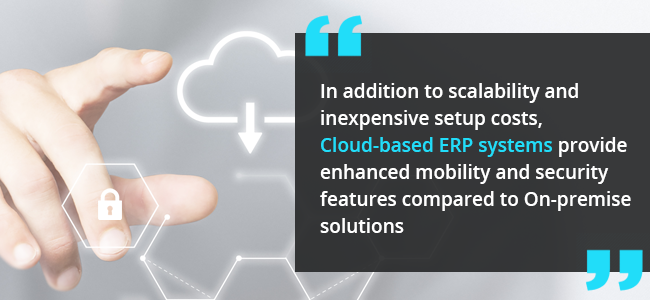
Most of the manufacturing ERPs provide two types of deployments, cloud-based and on-premises. In addition to scalability and inexpensive setup costs, cloud-based ERP systems provide enhanced mobility and security features compared to On-premise solutions. A cloud ERP also enables manufacturers to leverage latest technologies such as integrated IoT, mobile ERP, etc.
Conclusion
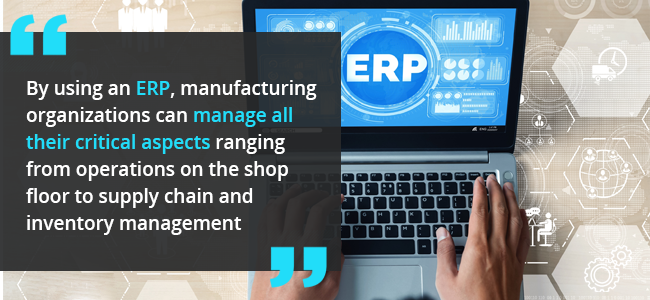
ERP systems enhance the organisational efficiency of a manufacturing firm by controlling and optimising how company resources are employed. By using an ERP, manufacturing organizations can manage all their critical aspects ranging from operations on the shop floor to supply chain and inventory management.
Producing items on time is easier for manufacturers with accurate production planning, improved inventory control and synchronisation across different distribution channels. When items are delivered on time, customers are more likely to be satisfied. A real-time ERP system gives decision makers a realistic picture of their operations at any given time.
Even though the capabilities listed above are only a small portion of what manufacturing ERP software may offer, they are worth considering for manufacturers who want to adopt or update their existing ERP applications.
If you want to know more about manufacturing ERPs, please feel free to contact us.


